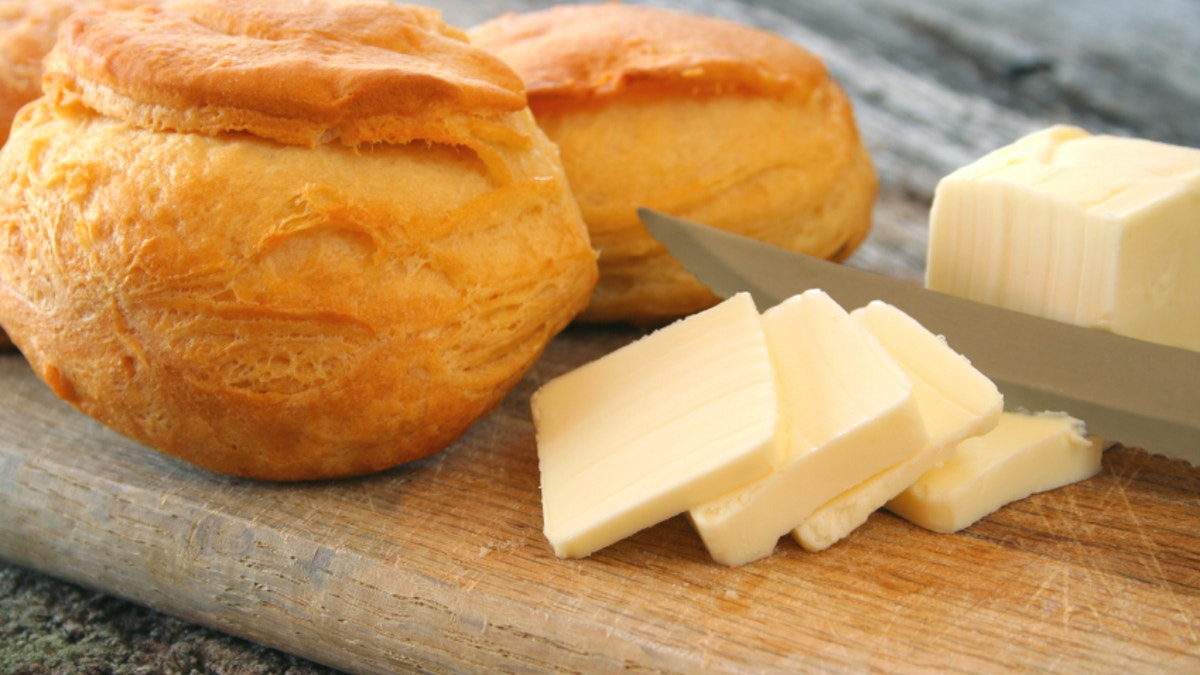
Just out of the oven biscuits with slices of butter to the side on a cutting board.
Is butter really artery-clogging enemy No. 1? For the past few years, a fierce debate has raged on among experts about saturated fat—is it bad or not? A new study from Journal of the American College of Cardiology offers some key insights.
After following close to 85,000 women and nearly 43,000 men, Harvard researchers found that what you eat instead of saturated fat, found in whole milk, cheese, and meat as well as butter, matters just as much for your heart as the total amount of saturated fat in your diet.
RELATED: 13 Best (and Worst) Ways to Measure Body Fat
To reach their findings, the researchers checked in with participants every four years over three decades to evaluate their diets and signs of disease. (Everyone was free of diabetes, heart disease, and cancer at the start of the study.) In the end, they found that when men and women replaced 5 percent of their saturated fat calories with polyunsaturated fats, like those in nuts, their risk for heart disease dropped by 25 percent. Replacing that same amount of saturated fat with monounsaturated fat (also found in nuts as well as olive oil) reduced participants’ heart risk by 15 percent. Meanwhile, trading “sat fat” for whole grain carbohydrates resulted in a 9 percent reduction in risk.
Finally, and this is the important part, the researchers found that swapping saturated fat for processed carbs, like white bread and white rice, had zero effect on heart disease risk.
In other words if you trade ice cream for cookies, or swap in white rice in lieu of extra cheese, you won’t do your heart any favors. But there might be some benefit to replacing a portion of the saturated fat in your diet with other plant-based fats and whole grains.
What about your beloved butter?
While I don’t think butter is your best fat option, I do think organic grass-fed butter is far better than margarine, which is processed and loaded with trans fats, which we know for sure are bad. Previous studies also seem to show that overall saturated fats may be neutral, and some, like those found in coconut and cocoa butter, are actually beneficial.
What this really shows, however, is that your health depends on your whole diet. So go ahead and eat a little saturated fat, but make sure you have it with lots of produce, as well as lean protein, whole grains, and other good fats, too.
RELATED: 11 Reasons Why You're Not Losing Belly Fat
To simplify things further, check out these 5 simple swaps. Each is designed to keep your diet balanced and best protect your ticker.
Choose spreads and substitutes wisely
If you have to choose between organic, grass-fed butter on whole grain toast versus a donut, I say pick the toast! But even better, try using ripe avocado or almond butter as spreads.
In a similar vein, instead of adding bacon and cheese to a burger, slather it with olive tapenade, guacamole, or tahini.
Eat meat with veggies
When using ground meat in loaves, meatballs, or casseroles, cut the portion in half, and fill it in with a combo of minced or shredded veggies, and either a whole grain, like quinoa or oats, or mashed beans. Sadly, the latest study didn’t look at replacing your saturated fat with veggies, but with everything we know about the health benefits of produce, I’m willing to bet this move can pay major health dividends.
RELATED: 24 Food Swaps That Slash Calories
Think beyond cheese
In a burrito, tacos, or a taco salad, replace cheese and sour cream with veggies, like spinach, mushrooms, bell peppers, and onions, along with brown rice, beans, and guacamole.
Snack smart
In place of cheese and crackers as an appetizer or snack, reach for nuts, olives, and popcorn (it’s a whole grain).
RELATED: 20 Snacks That Burn Fat
Tweak your treats
Cut your ice cream portion in half and top it with toasted oats and chopped nuts.
Cynthia Sass, MPH, RD, is Health's contributing nutrition editor. She privately counsels clients in New York, Los Angeles, and long distance. Cynthia is also the sports nutrition consultant to the New York Rangers NHL team and the New York Yankees MLB team, and is board certified as a specialist in sports dietetics.








































